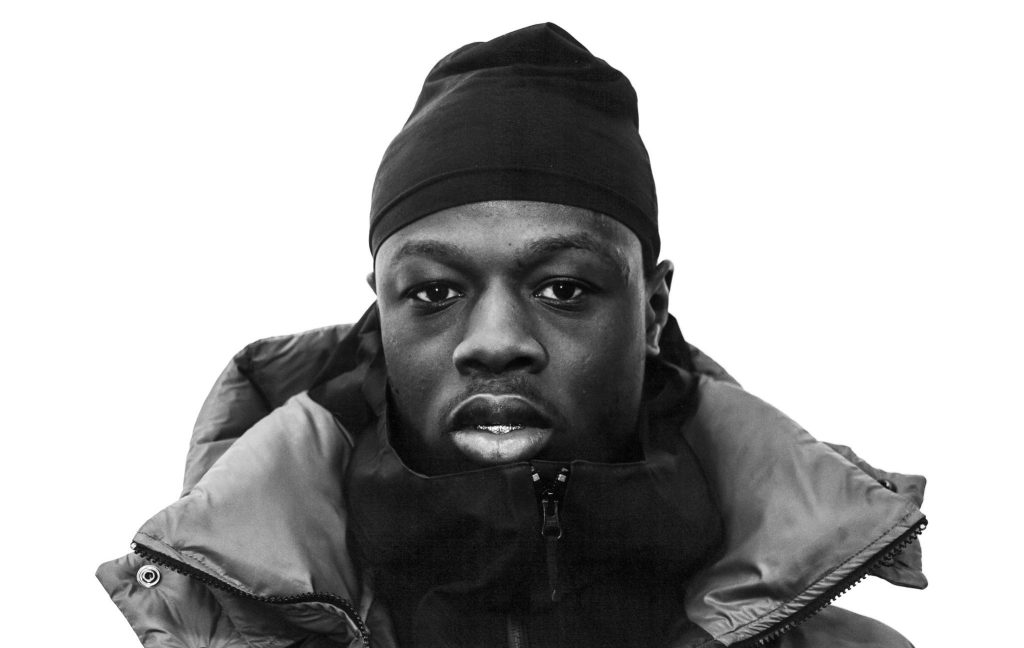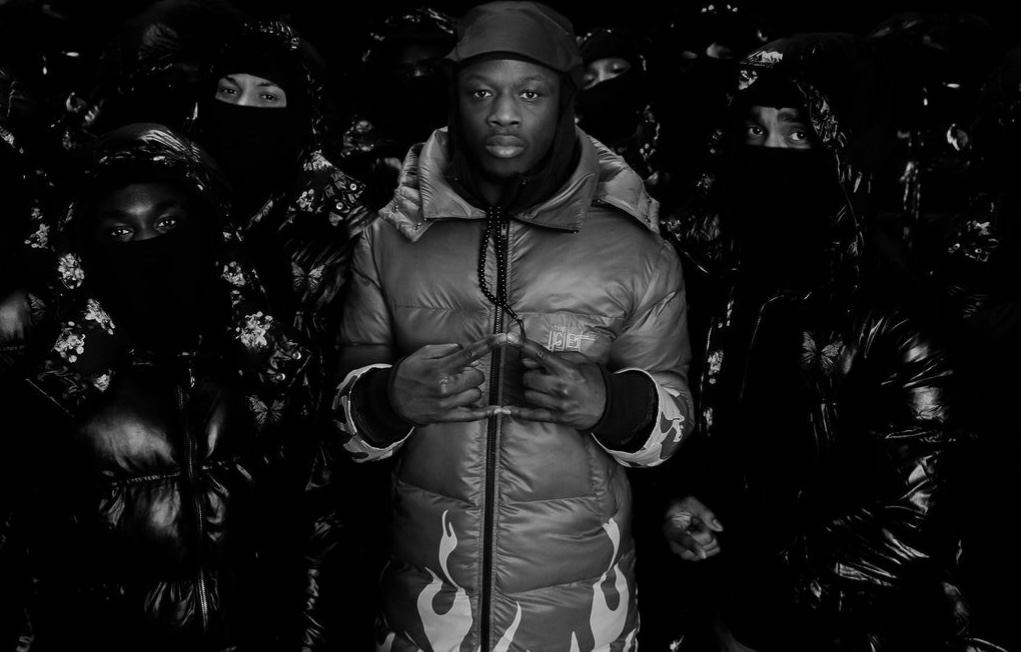Review: J Hus, ‘Beautiful and Brutal Yard’
The Stratford bully’s third album lingers on the spectrum of J Hus finesse and J Hus complacency, beautiful in potential yet brutal in execution.
A handful of artists can get away with being elusive. Kanye West. Frank Ocean. Kendrick Lamar. Their fans will always be on standby for music, through thick and thin. On this side of the pond, that is East London’s J Hus. His first two efforts, 2017’s Common Sense and 2020’s Big Conspiracy, are acclaimed classics, who up to that point rapidly established himself as the most exciting rapper in the country, pioneering Afroswing and injecting charisma into the scene. A three-year absence led to his next release becoming the most anticipated UK rap album of recent years. Initially assumed to be titled Don’t Say Militancy, the rapper finally dusts off his mic to see if he can strike a third time.
On Beautiful and Brutal Yard, J Hus offers an opened package; the product is delivered, but not signed or sealed.

Beautiful and Brutal Yard finds Hus in the same lane as his 2017 debut, Common Sense. It hosts similar runtime and a combination of tried-and-tested genres, from Afroswing to UK rap and drill (explored later in 2020). It’s a comfort zone for Hus, one he stays in throughout the album. Granted, familiar territory isn’t necessarily a bad approach. There are plenty of artists whom stick to a sound and consistently deliver. But with B.A.B.Y. there is the constant feeling of protected production, casual hooks, and ideas that had more potential than delivered. A master of melodies, J Hus’ B.A.B.Y lacks those earworms to rival the likes of his best work, or when they do the rest of the song has a caveat that caps the song’s enjoyment, such as Drake’s subpar appearance on “Who Told You” which has one of the album’s best hooks.
B.A.B.Y. does have enough memorable moments to make it a decent album. The heavily anticipated, drill-heavy “Cream” gallops with the darkest horsemen of violence, with CB unleashing the most barbaric UK drill verse of all-time. It’s as ‘brutal’ as the yard gets, aptly delivering on the themes of the album while also being a capable song. “Come Look” uses the same sample as Nas’ “Thun” to standout effect. “Massacre” gives shades of Big Conspiracy and its title track, entertaining through Hus’ creative inflexions. The three-track combo of “Militerian”, “Masculine” and “Nice Body” scratch the itch of summer Hus, a healthy dose that could have benefited from existing in a shorter tracklist. “It’s Crazy” sounds far superior within the album than as a single, though that comes with the advantage of average company.
Executive producer TSB described the album with three words: sex and violence. These are topics J Hus has always explored in creative, humorous ways. In reality, B.A.B.Y. straddles the scope of 2020’s Big Conspiracy for these very reasons. So the choice to tackle sex as a subject is not the core issue. Nor does Hus need to go To Pimp a Butterfly on us. The difference comes down to Hus not hitting the level of songwriting he’s demonstrated before—and at 19 tracks long, the focus becoming redundant. A song like Big Conspiracy’s “Play Play” entertains thanks to its use of a gun as a sexual metaphor, whereas songs like “Alien Girl” and “Fresh Water/Safa Kara” add no compelling spin to the topic of sex, ways only the mind of J Hus can conjure up. In the end, we’re left with juvenile lines that are not funny nor entertaining. There is a difference between enjoying sex and being chronically horny.
Fortunately, this isn’t the case for every cut. Track 14 finds Hus describing his gun not as a mash, skeng, or bunsam, but as a “Problem Fixer”. It’s a creative, unique descriptor that’s instantly quotable, one that matches the songwriting found on Hus’ all-time tunes. With more moments like these, B.A.B.Y. could have excelled into conversations to rival his previous two albums.
Other tracks deserve their spot on the album but have further potential than what’s presented. “Bim Bim” is a fierce anthem in the making, but without no payoff to the build-up comes across as an interlude. Album closer “Playing Chess” attempts to give an inkling of personal insight during the verses, but the hook’s focus on violence creates a disconnect that fails to hit as a finale; one of the album’s many examples of regressive songwriting. “My Baby” has one of the record’s best hooks, but the verses leave more to be desired; which makes sense as producer TSB revealed the rapper initially had the hook to the song and worked around it. These instances show that B.A.B.Y. needed refinement in key song fundamentals.
Given the album title, there was plenty of potential to hit the themes convincingly. Is sex the only beautiful aspect of Hus’ life? The record’s abbreviated to B.A.B.Y. yet there is no mention of his daughter in a single song. How about the loss of his father? This is where close collaborator Jae5’s distance comes into play, whose lack of involvement came down to Hus refusing the push for extra subject matter. Granted, Hus is not obligated to tackle traumatic areas of his life for our enjoyment. But as one of the UK artists regularly labelled ‘the GOAT’, a GOAT would throw some sort of bone to showcase evolution in his mindset and artistry.
The hardest part of a 19-track album must be figuring how to sequence it. B.A.B.Y. experiences such a crisis. It is unsure of what to mark as its intro, so it offers a double-billing of “Intro (The GOAT)” and “Massacre”. Following this, the record jumps head-first into “Who Told You”, a harshly awkward placement that comes far too early in the tracklist. “Comeback” would succeed far more as an album closer than “Playing Chess”, ideally following “It’s Crazy” in a penultimate placement. Even if the songs are not high calibre, these changes would make a significant improvement to the album experience.
A handful of songs prove why they should have been left on the cutting room floor, mainly due to their forgettable production and juvenile songwriting (“Alien Girl”, “Fresh Water/Safa Kara”, “Palm Tree”). These tracks were all previewed across the three-year wait, and all earn placement on the album, an unconventional move to include a majority of snippets and leaks onto the final product. Usually, if an artist leaves songs off an album, it’s because they weren’t good enough. Hus should have been decisive and channelled quality control for songs that add little to the themes and enjoyment of B.A.B.Y.
The Wolof-heavy “Come Gully Bun” shows potential with its off-kiltered beat, but struggles to build any momentum due to Hus’ monotone deliveries and absence of a true hook. Though Hus rapping in his native tongue is commendable, it is no surprise for listeners who habitually consume music in various languages. Considering the approach a risk panders to Western entitlement of English-exclusive music, which makes little sense when some of the biggest songs worldwide are Spanish-sung smashes with billions of streams.

Hus has proven to be a risk-taker on previous efforts, specifically when it comes to soundscape. Common Sense featured garage tunes in “Plottin” and 2000s hip hop for “Goodies”, while Big Conspiracy evolved UK drill with the unique “No Denying”, alongside its nocturnal, almost mafioso production during the first leg. Big Conspiracy in particular was such a step up in sound and songwriting that Hus would not be far off reaching—or even better, topping—on the next effort. However, B.A.B.Y. reduces the skilful songwriting and opts full for familiarity; a direct result of the safe approach to production. While no beats are horror-shows, there are little to no attempts to break up that familiarity across 19 tracks, something he was able to achieve on the 17-track Common Sense. Just a couple of daring beats could have been enough to maintain the idea that J Hus is a forward-thinking, innovative artist—a quality lacking at the highest ceiling of UK rap.
Such critiques exist because J Hus has shown the depths of his capabilities before. A listener cannot be expected to settle when higher standards have been demonstrated, particularly for an artist considered one of the greatest of all-time from two albums.
B.A.B.Y. is close to being something epic. There is a foundation in place, waiting to be propelled beyond a position of limbo. If it’s one thing we know, it’s that J Hus is at conflict with light and dark; highlighting, on a surface level, a man standing confidently on his contradicting morals.
6.5 / 10
Best tracks: “Massacre”, “Cream”, “Problem Fixer”, “Militerian”, “Come Look”



